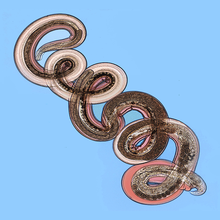Strongylida
| Strongylida | |
|---|---|
 |
|
| Nippostrongylus brasiliensis | |
| Scientific classification | |
| Kingdom: | Animalia |
| Phylum: | Nematoda |
| Class: | Chromadorea |
| Order: | Rhabditida |
| Suborder: | Strongylida |
| Superfamilies | |
The Strongylida suborder includes many of the important nematodes found in the gastrointestinal tracts of ruminants, horses, and swine, as well as the lungworms of ruminants and the hookworms of dogs and cats.
This suborder includes (superfamily - included families):
These are parasites of lizards and snakes. They have a direct lifecycle in soil.
These have very large buccal cavities. They infect the small intestine of mammal carnivores by skin penetration.
These have large buccal capsules with corona radiata. Most of them infect the large intestine by oral ingestion of the larva.
These worms have very small mouths and are found in a large number of hosts.
All of these parasites go through a snail to infect the lungs or vascular system of mammals, like artiodactyls, carnivores, marsupials, and cetacea.
...
Wikipedia
